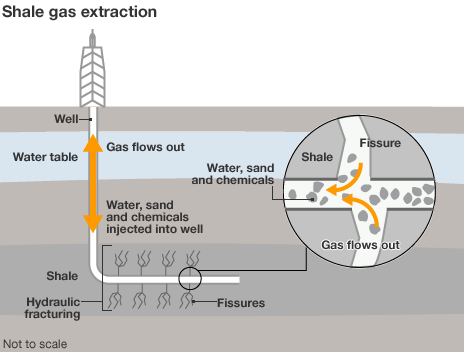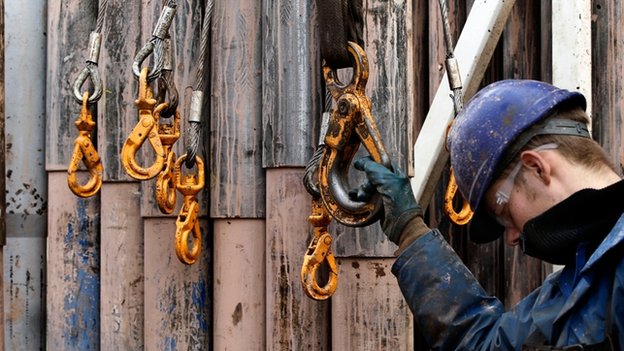Fracking
What is fracking and why is it controversial?
What is fracking and why is it controversial?
Drilling companies suggest trillions of cubic feet of shale gas may be recoverable from underneath parts of northern England, through a process known as "fracking".
Hydraulic fracturing, or fracking, is a technique designed to recover gas and oil from shale rock. But how does it work and why is it controversial?
What is fracking?
Fracking is the process of drilling down into the earth before a high-pressure water mixture is directed at the rock to release the gas inside. Water, sand and chemicals are injected into the rock at high pressure which allows the gas to flow out to the head of the well.
The process is carried out vertically or, more commonly, by drilling horizontally to the rock layer. The process can create new pathways to release gas or can be used to extend existing channels.

Why is it called fracking?
It is shorthand for hydraulic fracturing and refers to how the rock is fractured apart by the high pressure mixture. Experts also refer to a "frac job" and a "frac unit".
Why is it controversial?
The extensive use of fracking in the US, where it has revolutionised the energy industry, has prompted environmental concerns.
The first is that fracking uses huge amounts of water that must be transported to the fracking site, at significant environmental cost. The second is the worry that potentially carcinogenic chemicals used may escape and contaminate groundwater around the fracking site. The industry suggests pollution incidents are the results of bad practice, rather than an inherently risky technique.
There are also worries that the fracking process can cause small earth tremors. Two small earthquakes of 1.5 and 2.2 magnitude hit the Blackpool area in 2011 following fracking.
"It's always recognised as a potential hazard of the technique", says Professor Ernie Rutter from the University of Manchester, "But they're unlikely to be felt by many people and very unlikely to cause any damage."
Finally, environmental campaigners say that fracking is simply distracting energy firms and governments from investing in renewable sources of energy, and encouraging continued reliance on fossil fuels.
"Shale gas is not the solution to the UK's energy challenges," said Friends of the Earth energy campaigner Tony Bosworth. "We need a 21st century energy revolution based on efficiency and renewables, not more fossil fuels that will add to climate change."
What are the advantages of fracking?
Fracking allows drilling firms to access difficult-to-reach resources of oil and gas. In the US it has significantly boosted domestic oil production and driven down gas prices. It is estimated to have offered gas security to the US and Canada for about 100 years, and has presented an opportunity to generate electricity at half the CO2 emissions of coal.
The industry suggests fracking of shale gas could contribute significantly to the UK's future energy needs. A report by the Energy and Climate Change Committee in April said shale gas in the UK may help to secure energy supplies, but may not bring down gas prices.
Where is fracking taking place?
Reserves of shale gas have been identified across swathes of the UK, particularly in the north of England. However no fracking is currently taking place, and drilling firms must apply for a fracking licence if they wish to do so in the future.
http://www.bbc.co.uk/news/uk-14432401
Scottish Labour leader Jim Murphy pledges to block fracking

The exploration of onshore shale gas has proved controversial in the UK Scottish Labour leader Jim Murphy has said he would use new powers to block onshore fracking if he was to be elected first minister next year.
His statement has been welcomed by environmental groups.
The Scottish government said it would outline plans to strengthen its "precautionary approach" to fracking next week.
It said it was taking a cautious, considered and evidence-based approach to unconventional oil and gas.
The Scottish Parliament currently has power over planning issues but the Smith Commission has recommended devolution of onshore licensing and mineral access rights.
However, those new devolution powers will not come to Scotland until after May's UK General Election.
Last week, the UK government agreed to exclude Scotland from laws making it easier for fracking firms to drill for shale gas.
Mr Murphy said that if he was in power at Holyrood after the 2016 election he would ensure there would be no onshore fracking in Scotland until it had been shown beyond all doubt that it could be carried out safely.
He also pledged to allow local people to vote on fracking applications.

Mr Murphy called on the Scottish government to use its existing planning powers now to stop any onshore fracking immediately.
He said the UK government should suspend the current licensing round in Scotland until new powers are devolved through the Smith Agreement process.
"People are rightly concerned about shale gas," Mr Murphy said.
"They are worried that it will be imposed on their community against their will and without their consent. I will not let that happen."
Scottish government Energy Minister Fergus Ewing said he had written to his UK counterpart Ed Davey, calling on the UK government not to issue any more licences for unconventional oil and gas in Scotland.
Mr Ewing said: "I have long said that the issues of unconventional oil and gas should be decided in Scotland, not by the UK government who have taken a gung-ho approach to unconventional oil and gas and fracking."
http://www.bbc.co.uk/news/uk-scotland-scotland-politics-30959646
Comments (2)
-
Fracking is very ecologically dangerous and perilous. It can and has caused polluted and toxic water supplies that have made some people gravely ill. It can and has killed fish, birds, farm animals, crops and ecosystems. Fracking is just as bad as drilling for oil in marine and aquatic nature habitats.
-
Dear Brien, Thank you for your comments. Please vote for the local candidates https://www.commondecency.org.uk/may-7th-2015/2015-candidates-2



Leave your comments
Post comment as a guest